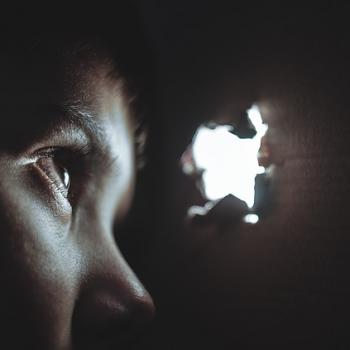This is Day 14 of the 2018 #30Days30Writers Ramadan series.
The story of the Quran begins in Ramadan, 610 AD. Muhammad, who was not yet the Prophet Muhammad, was in the habit of meditating in a cave high on the hillsides surrounding Mecca. On one such occasion, the angel Gabriel (Jibril) came to him and told him to read – iqra.
Muhammad replied that he could not read. Gabriel pressed him tightly and then commanded him again to read, and Muhammad again said that he could not read. Gabriel pressed him again and said:
1 Read! In the name of your Lord who created:
2 He created man from a clinging drop.
3 Read! Your Lord is the Most Generous
4 Who taught by the pen,
5 Taught man what he did not know.
These verses marked the beginning of revelation. Muhammad didn’t know what to make of what was happening to him. He ran down the mountain, his heart beating wildly. He was so terrified of the experience that he asked his wife Khadijah to cover him up. After he calmed down, he told her what had happened and confided that he was afraid for himself, unsure whether his experience was true or if he was going mad.
Khadijah reassured him that nothing ill could come to him, as he was a good man, known for upholding the ties of kinship, speaking truthfully, helping the poor and destitute, serving his guests generously and assisting those who were stricken by calamity. She also took him to her uncle Waraqa, a Christian monk, who agreed that Muhammad was indeed to become a Prophet.
The second revelation came a few weeks later:
1 You, wrapped in your cloak,
2 Arise and give warning!
3 Proclaim the greatness of your Lord;
4 Purify yourself;
5 Keep away from all defilement;
6 Do not be overwhelmed and weaken;
7 But be steadfast in your Lord’s cause.
These verses may refer to what happened after the first revelation or they may refer to the fact that when Muhammad saw the angel Gabriel again, he ran home frightened and once more begged Khadijah to cover him up.
Either way, practically from the beginning of revelation we see that the Quran is a book rooted in history, responding to the Prophet’s thoughts and actions and reacting to happenings in his life. While it presents many eternal lessons, it is also speaking into a context, directed at a particular culture and addressing the events occurring at the time.
Time and again, as we read through the Quran we are reminded of this fact. The beginning of Chapter 80 scolds the Prophet Muhammad for paying attention to important people and rebuffing a blind old man who wanted to learn more about the religion he had recently embraced. Chapter 3 discusses the believers’ behavior during the battles of Badr and Uhud. Chapter 24 addresses those who slandered Aisha with accusations of adultery.
The commentary and explanations of the Quran that are currently popular almost exclusively focus on the eternal nature of the holy book, proclaiming that not only is its wisdom and spiritual guidance intended to uplift mankind forever, but that the individual rulings pertaining to the specific circumstances Prophet Muhammad encounter are also universal.
As a progressive Muslim, I question that approach to the Quran, since the book is so clearly addressing a specific community in a specific historical context. I can’t help but think that God would have given different advice and different rules if the Quran were being revealed today.
I mean, surely if the Quran came to today’s society, with our understanding of domestic violence, God wouldn’t advise spouses who aren’t getting along so well to resort to physical retaliation? Surely in a society where familial bonds don’t extend much beyond the nuclear family, and men and women are both expected to be breadwinners, inheritance would be divided up more equally?
And, how about those draconian punishments for petty crimes? I must think that things would be very different.
Ramadan brings this belief into sterling clarity for me. The verses about fasting are unambiguous: “Eat and drink until you can discern the white streak of dawn against the blackness of night.” (Surah Baqara, verse 160) Clearly, this verse is not universal. It does not take into consideration Muslims who live above the Arctic Circle where for several months of the year the sun never comes completely over the horizon. Nor does it consider the impracticality of refraining from food and water when daytime last 18, 19 or more hours.
The only conclusion I see is that the injunctions about fasting talk specifically to the people of Mecca and Madinah, to their circumstances and situation, and was never intended to be rules for all places and times.
So, what’s a modern Muslim to do? How do we know what is universal and good for all times and what applies specifically to Muhammad’s era? For starters, there are values in the Quran that are clearly universal: Be mindful of God through worship, be charitable, be patient in the fact of difficulties, speak honestly and bear true witness, uphold contracts and oaths faithfully, keep family ties, be kind to strangers and travelers, speak kindly to others, don’t lord your wealth or power over those who lack them, count your blessings, use your brain to gain wisdom from the world around you and seek education, be modest in dress and speech, etc.
There are prohibitions that are also clearly universal: Don’t steal, especially not from orphans, don’t kill innocent people, don’t engage in casual or nonconsensual sex, don’t bear false witness, don’t cut off your family, don’t lie, especially about other people, don’t try to catch people out doing terrible things, don’t spread slander, don’t try to bribe people or take bribery, etc.
That leaves the rest of the Quran’s teachings. As a progressive Muslim, I believe we need to understand the Quran and its teaching through the lens of the history in which it was revealed into. We may come away with the same understanding we have always have, or we may come up with something new.
We may continue to believe particular verses are applicable universally. Or we may decide that God would want something different from us today than what was applicable in the seventh century.
For instance, verses that advise Muslims not to take non-Muslims as friends over fellow Muslims mean something quite different when you understand that the non-Muslims at the time had banished the Muslims from Mecca, confiscating their homes and possessions, and were actively working to eradicate the entire Muslim community, which was maybe a few thousand souls. Of course, you wouldn’t extend your trust to people who were trying to eradicate your entire community!
Compare that with today where multiculturalism is celebrated across the globe, and Muslims, Jews, Christians, Hindus, atheist, etc. in the west come together to feed poor people and build houses for the homeless, to support civil rights for all and struggle for a kinder, more just civilization. If the Quran had been revealed today, the injunction might be, would you take bigots for friends over those who love all, who believe and do good works?
While this may seem like a huge departure from traditional theology and jurisprudence, the companions of the Prophet clearly saw the Quran and its teachings in this manner. For instance, Omar suspended punishments for theft mentioned in the Quran during a famine. Clearly, he understood that as circumstances change, so too should our understanding of the Quran.
Progressive Muslims are suggesting nothing more and nothing less.














